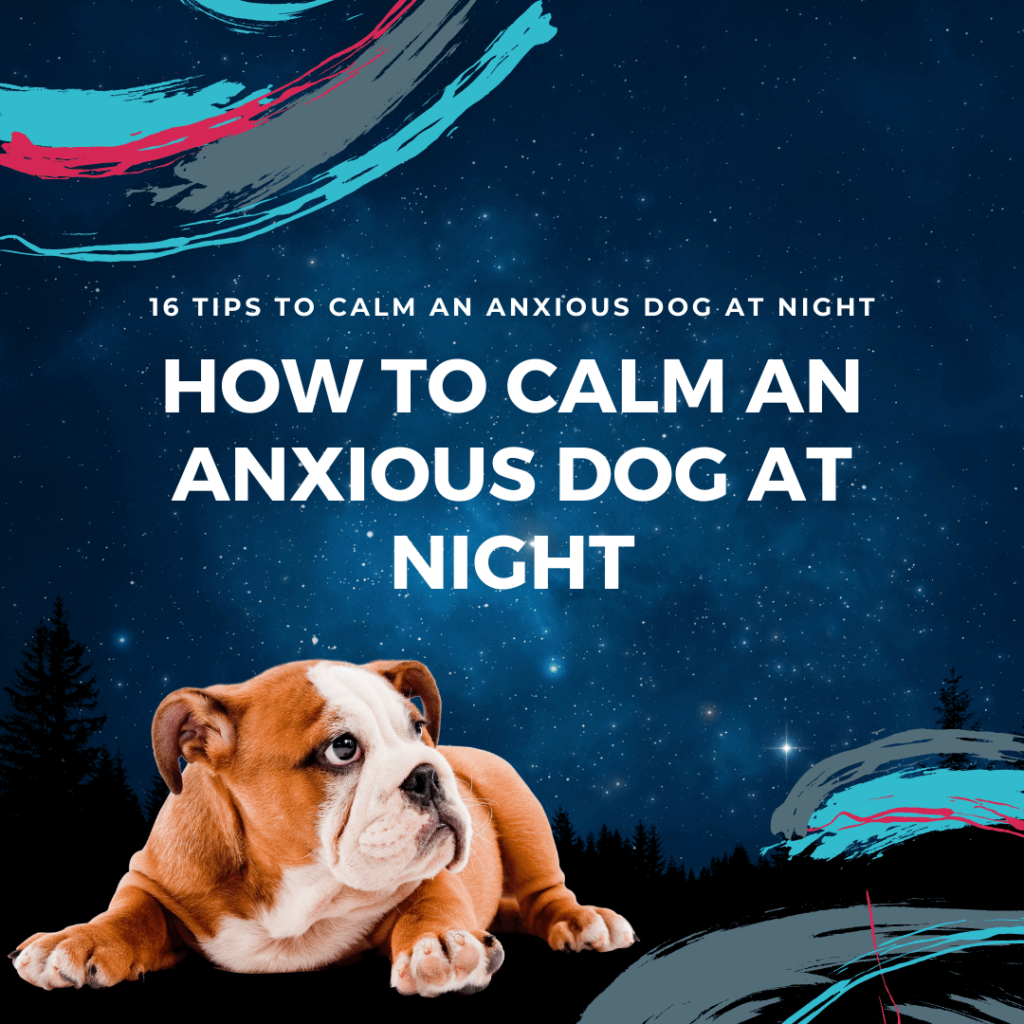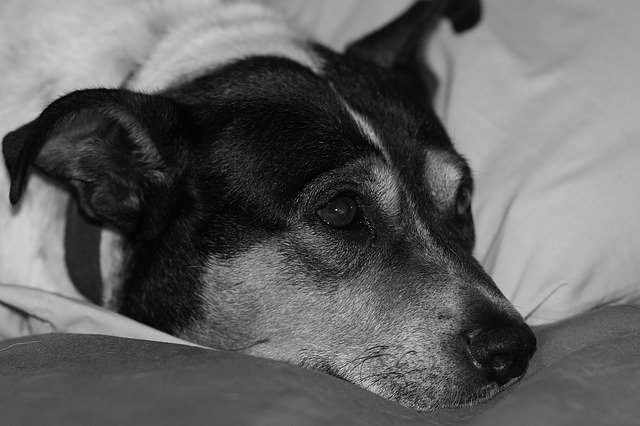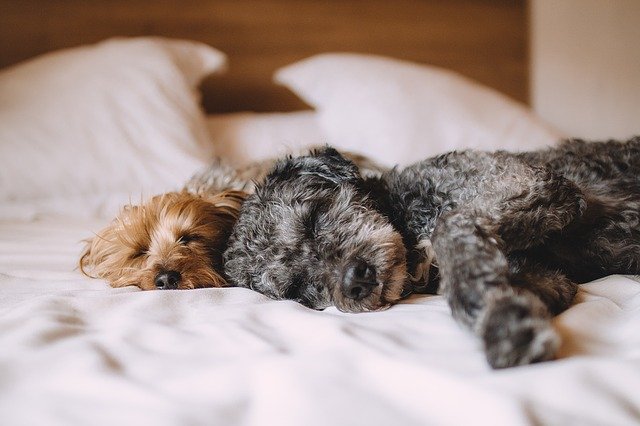All dog owners agree that their dogs are not just our pets but an integral part of their families. So it can be extremely disturbing when our pets display signs of suffering and anxiety, just like our family members. But how to calm an anxious dog at night?
This situation of anxiety and nervousness usually amplifies that at night when our dogs are left to sleep by themselves. And it gets particularly concerning when you are woken up by your dog’s howling, barking, and panting.
But all these episodes of panic attacks can be taken care of. The following set of rules have been compiled by experienced dog owners who have had experiences with calming anxious dogs at night.
Tips to calm an anxious dog at night
It might seem like a tall order to calm down a hyper puppy or an older dog, but with proper tools, it becomes fairly simple. One of the easiest ways to calm down an anxious dog at night is to make him comfortable.
This will in turn soothe your dog’s nerves so that you and your furry pal have a good night’s sleep.
To make a dog more peaceful and relaxed, there are several things you can do, some of the most effective techniques are listed below.

1. Give your dog a yummy treat
A truly tried and tested method of calming your dog before bed is to give him a treat. I usually recommend filling the pups Kong with his favorite treats or give him something hard to chew on.
This method works because your dog usually gets distracted by all nighttime noises and sounds. Regardless of the reason, this is a great tool to calm your dog down.
2. Make their sleeping area a Safe zone
For us humans, our beds are an important part of our lives. We enjoy our sleeping routines and specifically our warm plush beds. The same goes for our dogs. Dogs opt to sleep in a spot where they feel most relaxed and safe.
You should try to make your dog’s sleeping experience more comfortable by providing him with a warm blanket to snuggle in. His pen should be secure from the harshness of the environment.
A large variety of dog beds available on the market give your pal the option to sprawl out and relax. Anti-anxiety dog beds are also available these days to help your dog relax more.
Toys are just as important to a dog as their beds and blankets. It keeps them distracted and soothes the nerves of any hyper pooch.
Also, pay special attention to the room your dog sleeps in. Dogs prefer rooms that have a moderate temperature and are dark and noise-free.
All these conditions will improve your pup’s sleep quality and make him feel calmer.
3. Let your pup sleep next to you
As we discussed earlier that dogs like to sleep where they feel most comfortable. It helps reduce their stress levels. One way to diminish their stress levels at night is by letting your dog sleep near you. This is also a highly effective method to reduce separation anxiety.
But this doesn’t entail that your dog sleeps in your bed. This will be very uncomfortable for you as well as your dog. And in the long run, it will create way worse separation anxiety.
So, letting your dog sleep within range will help a lot, and reduce their separation anxiety.
4. Give your dog bedtime cuddles and massages
I have experienced that dogs showing nighttime anxiety do well if you give them gentle massages and rubs.
This nightly routine will soothe your dog’s anxious nerves. The result would be a much more happier and relaxed pooch.
5. Let your dog relieve himself before bed
Most dogs get restless at night because they need to relieve themselves. So make it a habit to let your dog out before bed so that he can complete his bathroom formalities.

6. Attempt separation training
Separation training is a long-term mechanism to calm an anxious dog at night. As in most cases, the reason for separation anxiety is the main culprit for a dog’s panic attacks.
Start by taking small steps, distance training is ideal in preventing your dog’s panic attacks at night.
There are several guides available on distance training, but in short, you have to leave your dog in a room for a little while, and gradually increasing the duration.
Ultimately, your dog will perceive that you will return. So, at bedtime, they will understand that you will be there in the morning.
7. Tire out your dog
More often than not, what looks like anxiety is your dog’s pent-up energy. That is why you need to exercise your dog daily to release that energy.
8. Take your dog for a stroll before bed
A little playtime or a gentle stroll before bed is a great way to calm down your dog. All this depends upon your dog’s energy level.
9. Play soothing music to your dog
Research shows that soothing music calms down anxious dogs. It not only distracts them from outside noises but increases their cortisol levels.
Music genres like classical, soft rock & country all have that calming influence on a dog. But always remember to keep the volume down so as not to wake up the neighbors.
10. Don’t overhype bedtime
One of the most common mistakes that dog parents make is to make their puppy’s bedtime a big deal. Don’t overthink it too much, like whether or not your puppy will go to sleep or not.
Just make sure that they have a cozy bed, food, water, and a warm blanket. The more relaxed you are the calmer your dog will feel.
11. Give your dog a fixed bedtime routine
Another mistake that most dog owners make is not following a fixed routine before bedtime. All disciplined and obedient dogs have one thing in common and that is they know that they have a strict routine to follow.
The fear of the unknown is quite overwhelming for a dog like not knowing the time or the place of their nap time. Or not knowing the whereabouts of their owner. All these put a tremendous toll on a pup and can lead to panic attacks.
Follow an easy but strict routine like going for a walk, have a nice massage, or time of their food. All these can drastically reduce anxiety and keep your dog calm.
This rule applies to pups and old dogs alike. If your dog has adjusted to his old routine and doing well, try not to change it unless necessary. This will greatly help in alleviating anxiety.

12. Give your dog social and phobia training
Train your furry friend to overcome his phobias. Also, make sure that your dogs are properly socialized to avoid any unnecessary anxieties at night.
Most dog trainers incorporate this by exposing the dog to several noises and phobias. Encouraging dogs of overcoming fear like a stranger petting them or a car passing by them, are just some examples of phobia training. Always use positive reinforcement for a calmer and stable dog.
13. Consider using natural remedies
Different homeopathic oils, tinctures, and other natural remedies are a great way to give your dog a good night’s rest.
Another great way to relax an anxious dog’s nerves is aromatherapy. Use of flower essences and other natural oils applied to the dog’s head or nose, or even put in their food can help calm them before bedtime.
14. Give anti-stress clothing a chance
Another commonly overlooked cause of nighttime anxiety is harsh environmental conditions.
Anti-Stress articles of clothing designed for your dog’s environmental conditions like earmuffs, head wraps, vests, etc., and are great for dogs that get anxious in unsuitable surroundings.
15. Consult a vet for Sleep medication
Sleep medication should be the last option for any dog owner. But if your vet suggests then it could help your dog greatly. Medicines like Melatonin, CBD oils, methionine, and pheromones are all used as sleeping supplements.
These are also used as anti-anxiety for dogs but as I said these should be used as a last resort. You never know as to how your dog will react to these meds so consult a vet for advice.
16. Most importantly get your dog checked by a licensed vet
If you have tried everything under the sun to calm your anxious dog at night. And nothing seems to work, then it is best to consult your local vet.
They can often point out things that you as a loveable dog parent aren’t able to see. There could be a variety of things that could work like medication, training, therapy, etc.

Conclusion on “How To Calm An Anxious Dog At Night”
Your beloved dog could be feeling anxious at night due to several reasons. Some might be physical while others are physiological. It could be a serious medical condition or a simple change in routine. Regardless all problems have a solution if you know where to look.
